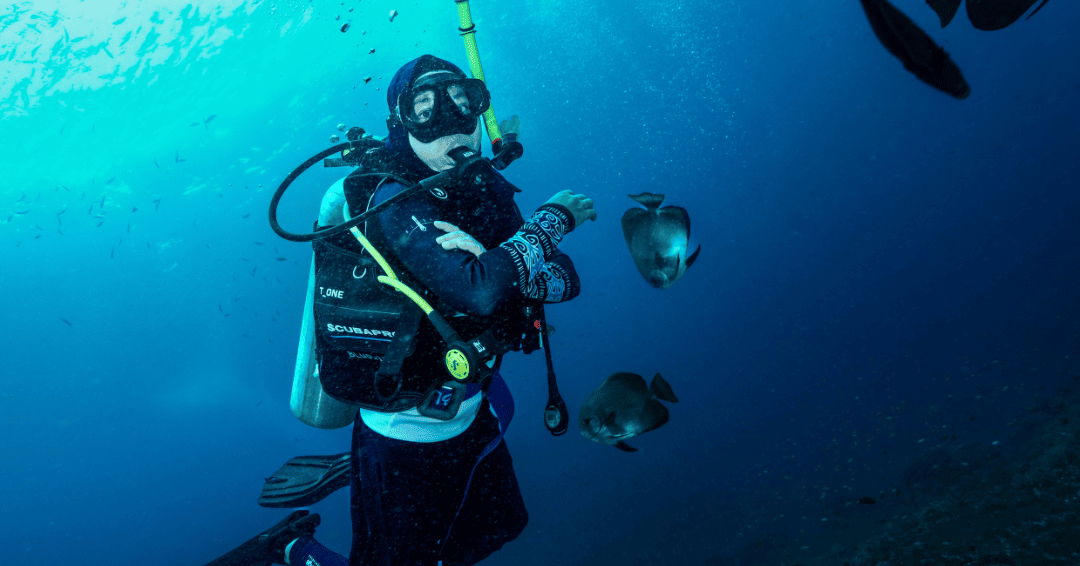Project title: Quantifying Water Quality and Microbial Drivers of Marine Heatwave on Coral Reef Resilience to Inform Restoration in Raja Ampat
Lead applicant: Nur Abu
Co-applicants: Awaludinnoer Ahmad, Syafri Tuharea, Prof. Carly D. Kenkel
Countries involved: Indonesia, United States
Takes place: Raja Ampat Archipelago (Indonesia)
Supporting institutions: University of Muhammadiyah Sorong (UNAMIN), Yayasan Konservasi Alam Nusantara (YKAN), BLUD UPTD Raja Ampat MPA, University of Southern California
Total budget: USD 99,707
Duration: 12 months
Project overview
The Raja Ampat Archipelago in Indonesia, with around 610 islands spread over 45,000 km², is one of the most species-rich marine ecosystems on Earth. Located at the heart of the Coral Triangle, it hosts more than 530 species of hard corals and over 1,580 reef fish species, making its shallow reefs the most biodiverse ever recorded. Raja Ampat is also home to approximately 68,500 people who depend on these ecosystems for food security and livelihoods.
Since the late 1990s, the rapid growth of marine tourism has transformed many local livelihoods, shifting income from artisanal fishing to tourism-related employment. Tourist arrivals surged from fewer than 1,000 in 2007 to more than 46,000 by 2019 — an increase of over 4,500% in just twelve years. While this boom has provided new economic opportunities, it has also placed mounting pressure on Raja Ampat’s fragile ecosystems.
Now, local stressors threaten to undermine the resilience of these reefs to global climate change. Recent studies reveal high levels of heavy metal contamination at popular reef sites, along with widespread cyanobacterial blooms and outbreaks of coral-killing sponges—all strong indicators of deteriorating water quality. These conditions compromise coral health, leaving reefs more vulnerable to disease and slowing their recovery from disturbances. Without tackling this root cause, even the many coral restoration projects underway across the archipelago risk falling short of their goals.
This project seeks to address the challenge directly by assessing the extent of water pollution linked to inadequate waste management and the impacts of the rapidly growing tourism industry. By evaluating how declining water quality affects coral reef communities, the team will provide the knowledge needed to guide more effective restoration and conservation strategies — ensuring that Raja Ampat’s reefs can continue to sustain both marine life and local communities.
Specific objectives
- Assess the extent of water pollution resulting from inadequate waste management and tourism-related activities.
- Evaluate water pollution impact on the coral reef communities of Raja Ampat.
How the objectives will be met
- Assess the extent of water pollution: Monitor water quality, reef benthic composition (including cyanobacteria and coral-killing sponges), corals’ microbiomes and microbial communities from water at nine sites with distinct waste disturbance levels*:
-
- Three sites near Waisai Port and adjacent coastal villages (high impact);
- Three sites within islands with established homestays (Intermediate impact);
- Three sites within uninhabited islands with no direct land-based sources of waste (control conditions).
-
- Quantify water turbidity, Total Suspended Solid (TSS), inorganic nutrients concentrations, and total chlorophyl.
- Evaluate water pollution impact: sample, extract and sequence DNA from mucus-associated epibiome of three species of corals (Porites clyndrica, Acropora hyachintus, and humilis) per site and depth. Sampled coral will be tagged and tissue samples will be taken for thermal tolerance testing.
* Note: monitoring will be conducted at two depths (3–5 m and 10–12 m) per site.
Impact of the project
- Create spatially explicit maps of water quality across all nine study sites, highlighting areas most affected by pollution and human activity.
- Provide evidence-based recommendations for improved waste management and mitigation of tourism-related impacts, supporting sustainable development in the region.
- Inform future coral restoration efforts within Raja Ampat National Park, ensuring that interventions target sites where restoration can succeed and thrive.
- Generate a list of microbial taxa associated with tolerant coral regardless of the water quality context, which can be pursued for subsequent probiotic development.
Major highlights
- Enhance local scientific capacity, supporting Indonesian scholars through international research visits, laboratory training, and capacity-building initiatives.
- Strengthens local communities’ ability to sustainably manage their marine resources.
- Maximizes the long-term impact of coral restoration efforts, ensuring that donor contributions translate into measurable, lasting outcomes.

